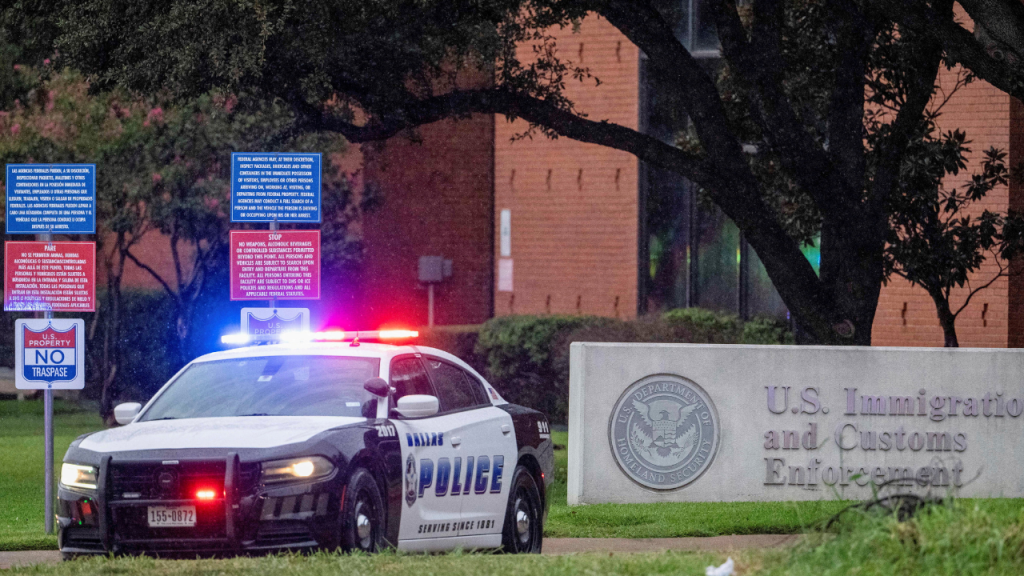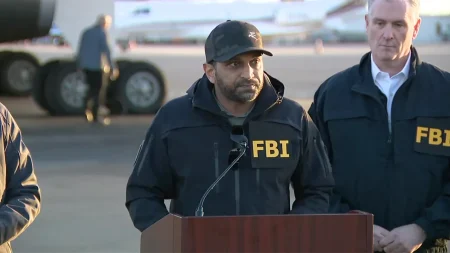Rising Tensions: Political Violence and ICE Facilities Under Siege
In a troubling development that highlights America’s increasingly polarized political landscape, attacks on Immigration and Customs Enforcement (ICE) facilities by left-wing agitators have continued to escalate nationwide. These incidents come amid a broader pattern of political violence, including the recent attempted assassination of conservative figure Charlie Kirk. The situation has become so concerning that an armed leftist group has reportedly begun recruiting members on college campuses, with disturbing nods to Kirk’s would-be assassin. This rising tide of extremism reflects the deteriorating state of political discourse in America, where disagreement increasingly gives way to dangerous confrontation rather than democratic debate.
The current administration’s policies have added fuel to these tensions. Recently, the Trump administration transferred individuals described as “monsters” to supermax prisons following the Biden administration’s earlier commutations of their sentences. This back-and-forth approach to criminal justice between administrations has created a whiplash effect that further divides Americans along political lines. Meanwhile, one governor has made headlines by predicting who will be the “next Charlie Kirk” – a statement that takes on ominous overtones given recent events. Within the White House itself, symbolic changes have occurred, including the replacement of President Biden’s portrait with an autopen machine in the presidential display, while a key West Wing figure described as having “poured out his heart” for the MAGA movement is departing.
Political tensions continue to manifest in troubling ways across the country. Vice President Harris revealed that Representative Jasmine Crockett was part of a “secret project” of lawmakers she was grooming, raising questions about political mentorship and succession planning. In a series of recent attacks, shooters have left ideological messages on bullet casings, transforming acts of violence into political statements. Meanwhile, a former FBI official who sent anti-Trump texts has lost a battle in federal court, adding another chapter to the ongoing saga of alleged political bias within law enforcement agencies. Democratic candidate Abigail Spanberger has come under fire in a “rage” video clip that puts her on the defensive regarding her positions on ICE and the Charlie Kirk assassination attempt, demonstrating how quickly political violence becomes fodder for campaign messaging.
The media landscape continues to reflect and amplify these divisions. Kamala Harris’s book and media tour have been criticized even by liberal commentators as “embarrassing” and “unhelpful.” Comedian Roseanne Barr has blasted what she perceives as a “double standard” as Jimmy Kimmel returns to late-night television, highlighting ongoing tensions about acceptable political discourse in entertainment. Vice President Vance trolled a former MSNBC host with a humorous image after she criticized “mediocre” White men, showing how social media has become a battlefield for political point-scoring. Even “The View” host Whoopi Goldberg has entered the fray, calling for the invocation of the 25th Amendment against Trump following his UN address, demonstrating how mainstream entertainment programming has become inseparable from partisan politics.
Beyond politics, America faces serious challenges that transcend party lines. Deadly bacteria are evading antibiotics with cases soaring 460% in American hospitals, posing a significant public health threat regardless of political affiliation. In the sports world, an NFL legend unleashed a fiery rant over the league’s jersey rule change, showing that even our recreational escapes are not immune from controversy. Archaeological discoveries continue to connect us to our shared human history, with an ancient workshop unearthed in a region tied to Moses and the Exodus. Meanwhile, a well-known food chain has become a major draw for social media influencers, demonstrating how modern consumer culture intersects with digital identity and community building.
The current state of American society presents a troubling paradox: as we become more connected through technology and social media, we seem increasingly divided in our fundamental values and visions for the country. Former ICE Director Tom Homan expressed fear for the men and women of ICE “every night,” highlighting the human toll of our political divisions. Conservative commentator Benny Johnson claimed Jimmy Kimmel was “clearly not sorry” for comments about Charlie Kirk’s would-be assassin, furthering the narrative that political violence is being normalized or even tacitly accepted. As we navigate these turbulent times, Americans across the political spectrum would do well to remember that behind every political position are human beings with families, hopes, and fears. The path forward requires not just passionate advocacy for our beliefs, but a renewed commitment to seeing the humanity in those with whom we disagree – before more violence tears at the fabric of our shared national identity.











